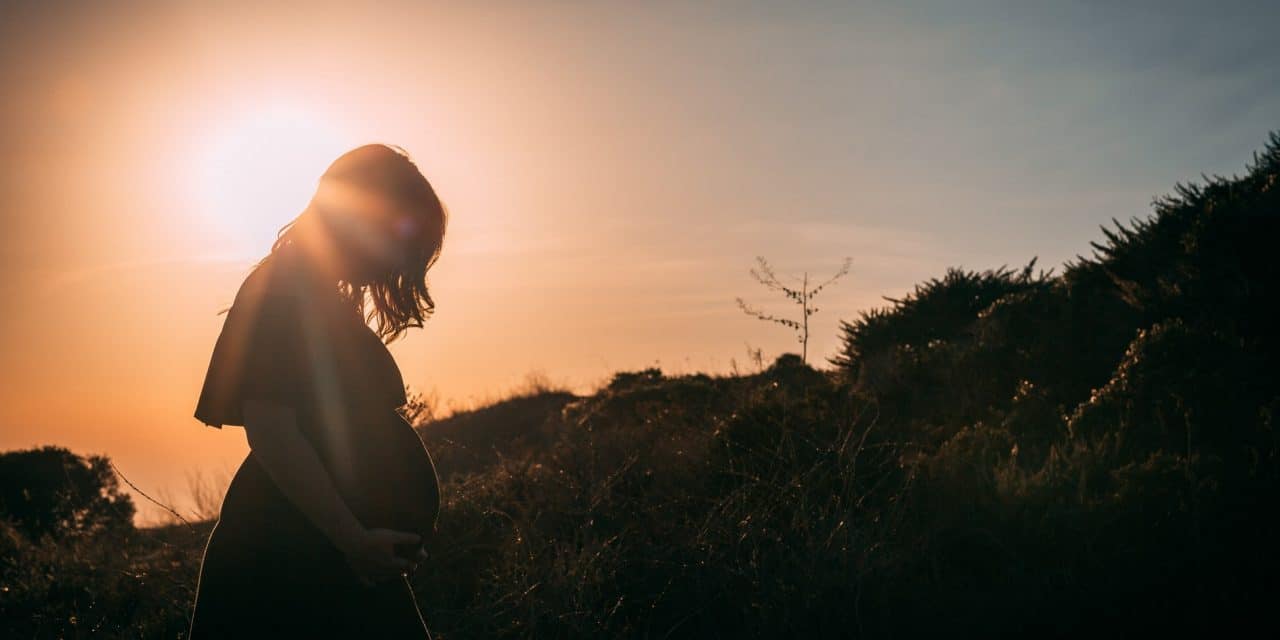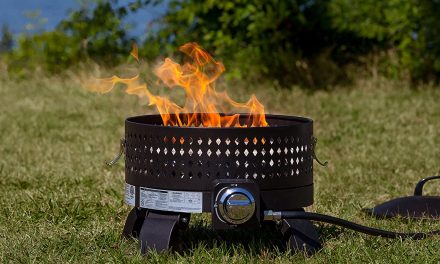Pregnant women are frequently told that there’s a lot of things they shouldn’t do. Whether it’s avoiding raw seafood or staying clear of hot tubs and saunas, many expecting mothers often feel like there’s not much they can do besides sit and wait for their child to arrive.
However, just because you’re pregnant doesn’t mean you have to stay indoors. In fact, enjoying some quality outdoors time during a camping trip is a great way to get some fresh air and exercise as you plan to add another person to your family.
But, is it safe to camp while pregnant? Coming up, we’ll discuss everything you need to know about sleeping under the stars while mid-term. Plus, we’ll offer some top tips for making your next camping while pregnant experience a great one.
Why Go Camping When Pregnant?
Camping might not seem like your traditional pregnancy activity, but it can be a nice way to have some fun while you’re expecting. Here are some of the reasons why camping while pregnant is a great idea:
- Exercise Long gone are the days where women were confined to their beds for the majority of their pregnancy. Nowadays, medical professionals encourage women to stay active while they’re expecting. Camping offers plenty of opportunities for exercise, which is perfect for expecting mothers. In fact, there are plenty of benefits to exercising while pregnant, which we’ll discuss in a bit.
- Fresh Air. Camping is an easy method for getting lots of fresh air. Indeed, studies show a connection between high levels of air pollution and premature births. So, camping can be a great way for expectant mothers to both enjoy the outdoors and avoid spending lots of time in overly polluted cities.
- Family Bonding. If you already have children, a weekend camping trip can provide some quality family time together before your new arrival. Even if you’re not feeling up to a long hike, you can always relax in the campground while your kids enjoy some small adventures. Or, if you’re a first-time mother, you can simply enjoy some time alone with your partner before your first child arrives.
- Affordable Babymoon. “Babymoons” are becoming more popular every year as a way to enjoy one last trip as a couple before the arrival of their first child. While some couples choose to splash out on a big trip, a camping adventure can be a relaxing and affordable way to get away from the hustle and bustle of day to day life.
Is Camping When Pregnant Dangerous?
Expecting mothers are often concerned about the health of their unborn child during pregnancy, and rightly so. But, the good news is that camping when pregnant isn’t inherently dangerous – if you know what you’re doing.

Should You Stay Active While Pregnant?
Unfortunately, most reputable medical sources don’t specifically talk about camping while pregnant. So, we have to look at the advice that these professionals give for staying active during pregnancy and infer how this guidance relates to camping.
Most medical professionals recommend that pregnant women exercise, particularly if they have a low-risk pregnancy. The American College of Obstetricians and Gynecologists (ACOG) states that there are plenty of benefits to exercise, including:
- Decreased risk of developing gestational diabetes and preeclampsia
- Lower risk of uncontrolled weight gain
- Improves overall health and fitness
- Can help reduce back pain
- May ease constipation
However, the ACOG does say that some women with pre-existing conditions or complications shouldn’t exercise without consulting a doctor. This includes women who:
- With certain kinds of lung and heart diseases
- Are expecting twins, triplets, or more
- Have experienced preterm labor during exercise while pregnant
- Are severely anemic
- Have preeclampsia or placenta previa
Spending Time Outside While Pregnant
Generally speaking, medical professionals encourage women with low-risk pregnancies to take part in regular low-impact exercise. These exercises include walking, swimming, yoga, and strength training.
But, at the same time, women generally aren’t encouraged to start a new form of exercise while they’re pregnant. This is particularly true for activities like running, which can put a lot of stress on the body, especially as it changes in response to pregnancy.
However, many outdoor activities are great, low-impact ways to get exercise while pregnant. Hiking, paddling, and – yes – camping, are all good options. That being said, the ACOG recommends that pregnant women avoid any activity that could result in a fall, such as downhill skiing and mountain biking.
A short camping trip is a low-impact way to get outdoors even when you’re mid-term. But, if you’re in doubt, it’s always best to discuss your concerns with your OB or medical professional.
Considerations for Camping When Pregnant
When planning your next camping trip, keep the following in mind:
- Location. Depending on how pregnant you are when you go camping, you might need to choose your location wisely. When deciding on a camping location, consider how far you are from the nearest hospital. Also, be sure that at least one nearby hospital has an OB on call at all times. This is particularly important if you’re nearing the end of your pregnancy or if there’s a high chance of complications.
- Your Health. The health of both you and your child is of the utmost importance during a pregnancy. So, if you’re not feeling well, it’s probably not wise to go on a camping trip. When in doubt, speak to your OB or medical professional for advice.
- Comfort And Experience. Medical professionals encourage pregnant women to stay active. But, they also recommend that expecting mothers stick with activities that they already do. If you’re new to camping, pregnancy probably isn’t the best time to start.
- Timing. Most women – particularly first-time mothers – find that they don’t feel well during the first trimester. Additionally, many find that they are quite uncomfortable during the third trimester. The second trimester, however, is when most pregnant women feel the most energized and ready for activity, so it’s generally better for camping.
- Trip Length. Depending on how far along you are in your pregnancy, you may want to keep your camping trip short. 2-5 nights out is usually a good compromise between comfort and adventure.
Safety Tips For Camping While Pregnant
Camping while pregnant can be a fantastic experience, but you want to be sure that you don’t put yourself or your baby at risk. So, here are some key safety tips for camping while expecting:
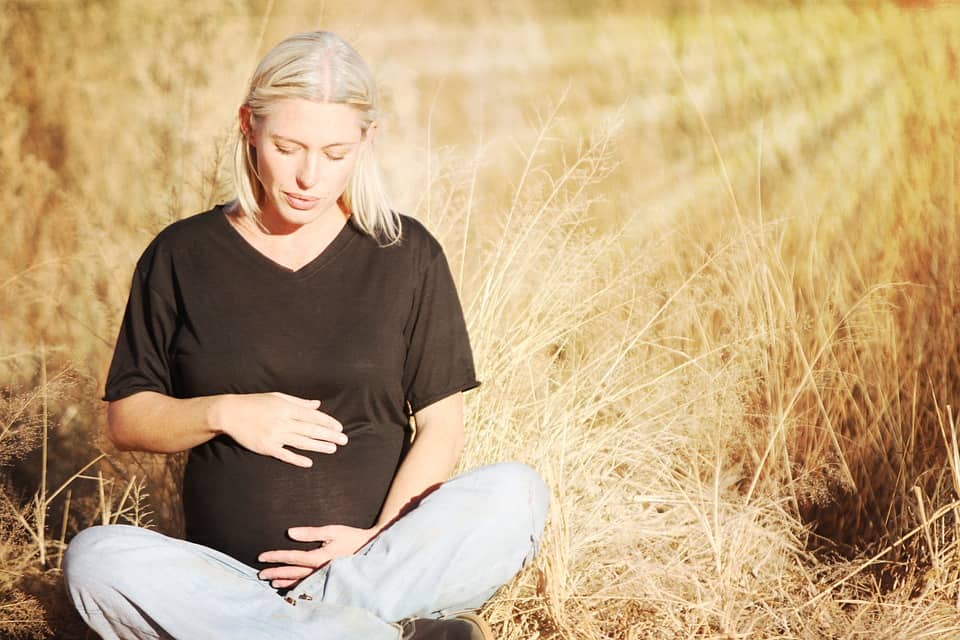
If You’re In Pain, Stop
The number one rule for camping and staying active while pregnant is that it shouldn’t be painful. According to the Hospital for Special Surgery, if you’re in pain, have bleeding, or your baby stops moving, you should stop whatever you’re doing. Then, immediately contact your OB and seek professional medical help.
Eat Enough Food
Most pregnant women are advised to consume an additional 300 calories a day to help provide their baby with enough energy. But, you’ll likely need to eat more just to stay warm if you’re camping during the fall, winter, or spring. For more specific advice, consult your OB for guidance.
Stay Hydrated
Hydration is important for everyone, but it’s particularly critical for expecting mothers. According to the College of William and Mary, pregnant women should expect to consume at least 64 ounces (1.9L) of water per day. Drinking water is especially important during the third trimester because dehydration can lead to preterm labor.
Watch Your Heart Rate
Most people can figure out their maximum heart rate by subtracting their age from 220. But, pregnant women should generally limit their heart rate to just 60-80% of their maximum. An easy way to monitor your heart rate is through a fitness tracker, like a Fitbit. Your OB can provide more guidance on your ideal heart rate if you’re looking to do a lot of hiking while pregnant.
Mind Your Step
As you get further along in your pregnancy, you might start to struggle with your balance. This happens because your growing belly can quickly shift your center of gravity. So, when hiking on rough terrain, be mindful of where you step. It might be a good idea to use trekking poles for added support.
Avoid Lying On Your Back
Lying flat on your back while pregnant can cut off blood flow to your heart. So, you’ll need to sleep on your side, even while camping out on a sleeping pad. We’ll discuss some ways to stay comfortable while camping in a bit.
Take Frequent Breaks
Growing a tiny human is hard work, so don’t be afraid to take frequent breaks while you’re camping. This is particularly important if you’re going out on a long hike as you might get tired more quickly than expected. Speak up if you need to slow down or take a short break.
Pack Light
Carrying a heavy pack while pregnant can cause a lot of pain. Frequent backpack use can cause kyphosis, or a curved upper back. Meanwhile, pregnancy can cause lordosis, or a curved lower spine. So, pregnant women should take some special precautions while wearing backpacks. Here are some options:
- Pack Intelligently. Pack your bag so that the heaviest items are at the bottom. This can help move your center of gravity to prevent you from leaning forward.
- Change Packs. Use a shorter backpack, which places less strain on your shoulders
- Don’t Use The Hipbelt. Most hiking and backpacking packs will have a hipbelt that helps to shift some of the weight off of your shoulders and onto your hips. But, you probably won’t be able to use this hipbelt during the second and third trimester.
- Go Light Weight. During the later stages of pregnancy, you just won’t be to carry as much as you used to. This is nothing to be ashamed of. Try and minimize your pack weight so you don’t put too much strain on your body.
Is It Safe To Sit By A Fire While Pregnant?
Campfires are a highlight of most outdoor trips. But, is it safe to hang out by a roaring bonfire when you’re pregnant?
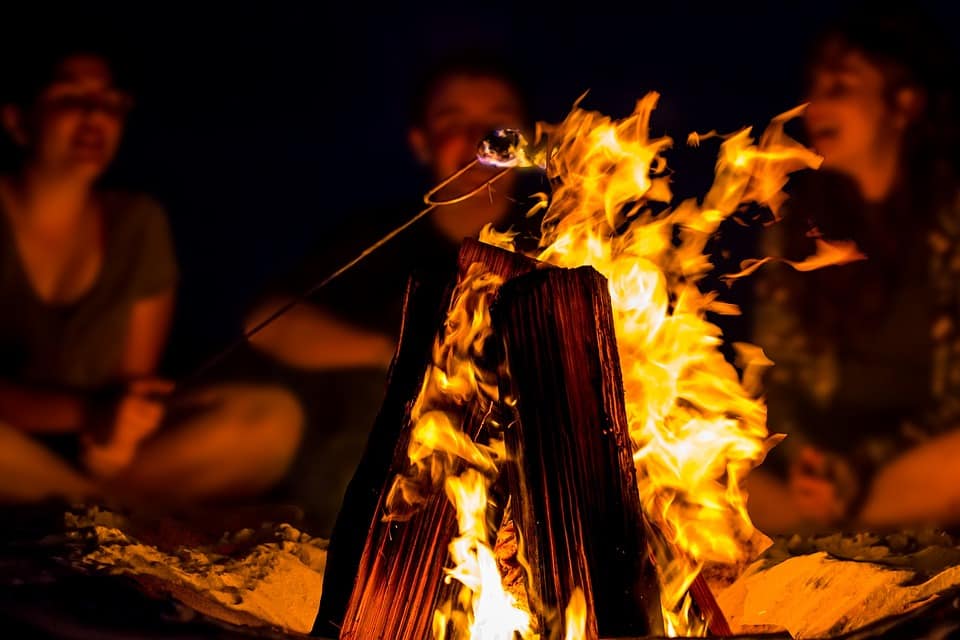
Health Effects Of Smoke Inhalation During Pregnancy
The short answer is no, it’s not completely safe to sit by a fire when you’re expecting. According to the EPA, smoke of any kind is not good for humans. Even if the smoke is from burning wood at a campfire, it can contain lots of microscopic particles that can negatively affect your health. Smoke inhalation can cause:
- Heaches
- Nausea
- Dizziness
- Shortness of breath
- Irritated eyes, throat, and sinuses
- Coughing and wheezing
Additionally, regular or severe smoke inhalation can cause long-term health effects. This includes an increased risk of developing heart disease and respiratory issues, such as asthma and bronchitis. Frequent exposure to smoke has also been linked to an increased risk of some forms of cancer.
According to the CDC, pregnant women are particularly vulnerable to negative health effects from smoke inhalation. The CDC states that high levels of carbon monoxide and smoke can lead to birth defects, issues with the unborn baby’s nervous system, or even miscarriages.
A study from universities in Colorado even found that exposure to wildfire smoke during the second trimester was correlated with preterm birth, as well as an increased risk of gestational diabetes and high blood pressure in the mother. Meanwhile, a UC Berkley study found that exposure to smoke was connected to lower birth weights.
Campfire Safety While Pregnant
Currently, there aren’t any studies that directly look at the effects of campfire smoke inhalation on pregnancy. But there is plenty of relevant research on the effects of wildlife and house fire smoke on pregnant women and their unborn children.
The research is clear that smoke inhalation is not good for an expecting mother or her child. So, it’s probably best not to sit next to a campfire if you’re pregnant.
If you really want to have a fire on your next camping trip, it’s worth discussing it with your OB, and make sure that you follow the campfire safety tips. They may recommend that you sit upwind and quite far away from the fire to limit your exposure to the smoke. But, you may find that having a campfire while pregnant just isn’t worth the risk.
Is It Safe To Camp At High Altitudes While Pregnant?
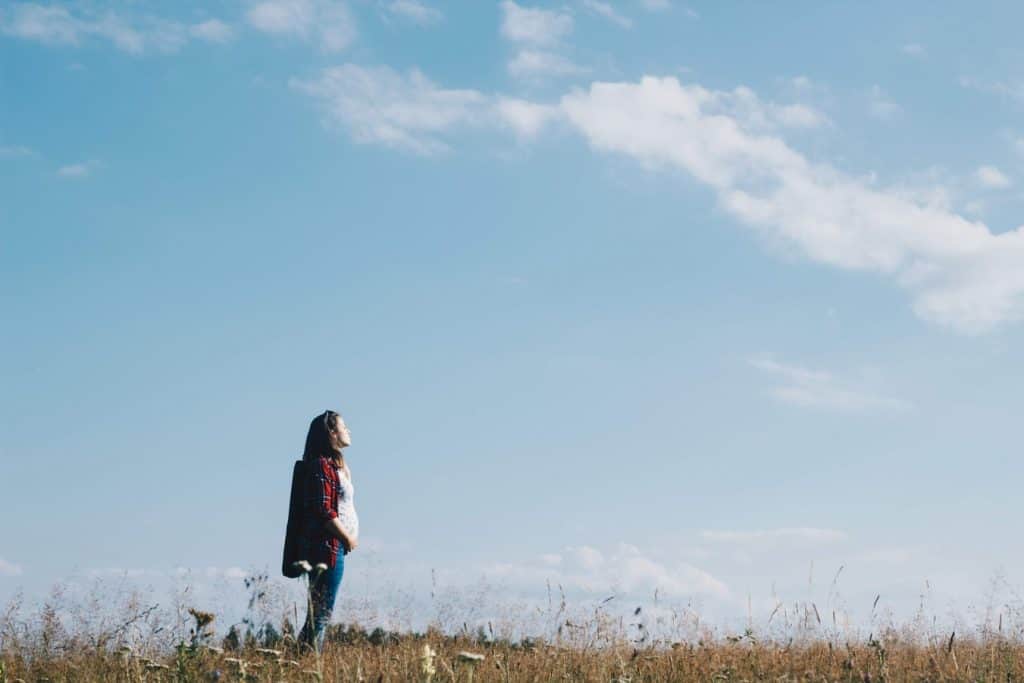
Depending on where you live, you may already be exposed to moderately high altitudes. However, many OBs and medical organizations recommend that women avoid traveling to or camping at high altitudes while pregnant.
The World Health Organization (WHO) states that women should avoid traveling to places above 9,845ft (3,000m) during pregnancy. A 2012 French study found that women with certain pre-existing conditions, including preeclampsia/hypertension, should be diligent about avoiding high altitudes after the 20th week of pregnancy.
But, much of the current medical advice on traveling to high altitudes while pregnant relies on small-scale studies, so it’s not clear what the actual risks are to expecting mothers or their babies. Some studies show that exposure to high altitude environments can potentially stress the ability of a pregnant woman’s body to get oxygen to her baby.
While there are countless pregnant women that live and exercise at high altitudes to no ill effect, these are mostly women who have spent their whole lives living at extreme elevations. Thus, the CDC recommends that pregnant women avoid traveling to high elevations, particularly if they are unaccustomed to high altitudes.
How To Stay Comfortable When Camping While Pregnant
Camping while pregnant might sound a bit uncomfortable, but it certainly doesn’t have to be here are some top tips for making your next pregnant camping trip a relaxing getaway:
Pregnant Camping Gear Recommendations
If you’re looking to sleep under the stars while pregnant, you may need to pack some extra gear. Consider including these items in your packing list:
- Body Pillow. Pregnant women are generally encouraged to sleep on their side to avoid accidentally cutting off blood flow to the heart. If you’re not used to side sleeping, a body pillow can make a huge difference in your comfort. You can also try a camping pillow for some added luxury.
- Air Mattress. Comfort is critical for getting a good night’s sleep. For that reason, no pregnant woman should be sleeping on a thin foam pad. Instead, invest in a quality camping air mattress. If you really want to maximize your comfort, a tent cot is a good option for car camping.
- Camping Chair. A camp chair is a great way to stay comfortable during mealtimes. It’s also the perfect place to sit when you’re hanging around in camp during the later stages of pregnancy.
- Tall Tent. When you’re pregnant, you probably don’t want to have to crawl into your tent. So, a tent with a high center height and tall doors can make things way easier while camping.
- Pregnancy-Safe Sunscreen & Bug Spray. Sunscreen is a must-have for every camper, but make sure you get a baby-safe version to limit your exposure to chemicals. The CDC states that DEET sunscreens are safe for pregnant women if used as directed. But, you may choose to use a natural option if you’re not interested in chemical-based products.
- Emergency Medical Information. Before you go camping, make a document with pertinent medical information, health insurance information, and your OB’s phone number. Print out the list and pack it with you, just in case you need to go to the hospital in the middle of your trip.
Other Tips For Pregnant Camping
Now that you know what gear to pack, here are some other top tips for staying comfortable during your next camping trip:
- Dress In Layers. Wearing multiple layers of clothing instead of one huge jacket is an easy way to stay comfortable outdoors.
- Make Hygiene A Priority. Getting sick is something you want to avoid while pregnant. So, ensure that everyone in your group is washing their hands frequently, especially if they’re in charge of cooking.
- Bring Lots of Snacks. High-protein snacks can help you stave off hunger while camping. These snacks are particularly important if you have small children and often can’t sit down long enough to eat full meals.
- Keep Water Accessible. As we’ve mentioned, hydration is critical for pregnant women. So, have a large water bottle or hydration system easily accessible at all times.
- Take A Walk. If you have achy joints during your camping adventure, take a short stroll around the campground or the nearby area to limber up. This can help relieve some of your discomfort.
- Stick To Your Favorite Locations. Mid-pregnancy is not the time to start exploring new, remote camping locales. If you’re just looking for a nice weekend outside, consider using with a campsite you already know and love.
- Consider Your Bathroom Needs. A family-friendly campground with running water is ideal, but if you’re backpacking, remember that you’ll need to use the toilet more often when you’re pregnant. Think about how you plan to manage your increased need to go and be sure you’re comfortable with taking care of these bodily functions while outside.
Best Camping Foods When Pregnant
Pregnancy is known as time where weird food cravings make an appearance in your day to day life. So, here are some food items you might want to pack for your next camping getaway:
- High-Fiber Food. Many women get constipated while pregnant, so high-fiber foods can be helpful. Consider packing chia seeds for your morning oats, apples and oranges as mid-day snacks, and some avocados to slice for your lunch-time sandwiches.
- Protein-Rich Food. Protein is important for pregnant women as it helps with fetal growth. Make yourself a trail mix that’s full of nuts as a snack for hiking days. You can also include beans and other legumes in your dinner time recipes. Eggs are a great option for breakfast, and you can even get powdered eggs for backcountry trips.
- Hot Cocoa & Pregnancy-Safe Tea. Many pregnant women are told to avoid caffeine, so you might want to pack hot cocoa and un-caffeinated teas for your trip.
- Craving Foods. Whatever your current craving is, don’t forget to bring it with. Whether it’s chocolate, cheese, peanut butter, or an interesting food combination, figure out how you can pack your craving on your next camping adventure.
Prioritize Your Comfort While Pregnant Camping
At the end of the day, camping is a fantastic way to stay active during your pregnancy. However, for the health and safety of both you and your child, be sure to prioritize your own comfort and consult your doctor if you need specific advice about camping mid-term. With the right precautions, a pregnant camping trip can be a wonderful experience that you remember for years to come.
- Tint Colors Explained For Polarized Sunglasses - November 19, 2022
- Top 4 Best Portable Camping Showers of 2022 - November 19, 2022
- How to Choose Water Shoes & What to Look For - November 18, 2022

